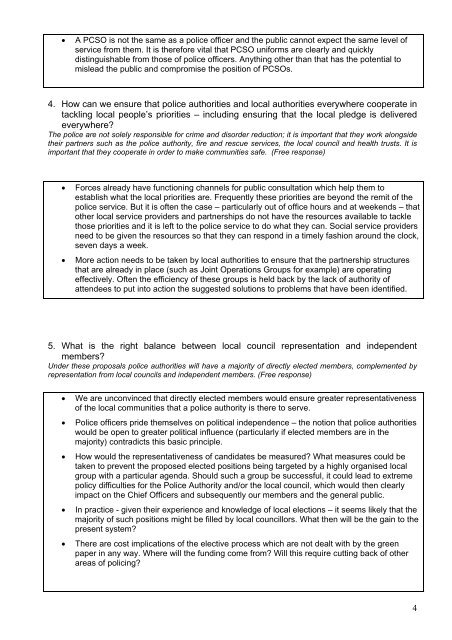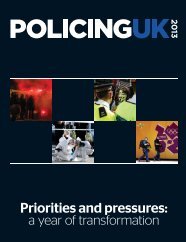THE POLICING GREEN PAPER - Police Federation
THE POLICING GREEN PAPER - Police Federation
THE POLICING GREEN PAPER - Police Federation
You also want an ePaper? Increase the reach of your titles
YUMPU automatically turns print PDFs into web optimized ePapers that Google loves.
• A PCSO is not the same as a police officer and the public cannot expect the same level of<br />
service from them. It is therefore vital that PCSO uniforms are clearly and quickly<br />
distinguishable from those of police officers. Anything other than that has the potential to<br />
mislead the public and compromise the position of PCSOs.<br />
4. How can we ensure that police authorities and local authorities everywhere cooperate in<br />
tackling local people’s priorities – including ensuring that the local pledge is delivered<br />
everywhere?<br />
The police are not solely responsible for crime and disorder reduction; it is important that they work alongside<br />
their partners such as the police authority, fire and rescue services, the local council and health trusts. It is<br />
important that they cooperate in order to make communities safe. (Free response)<br />
• Forces already have functioning channels for public consultation which help them to<br />
establish what the local priorities are. Frequently these priorities are beyond the remit of the<br />
police service. But it is often the case – particularly out of office hours and at weekends – that<br />
other local service providers and partnerships do not have the resources available to tackle<br />
those priorities and it is left to the police service to do what they can. Social service providers<br />
need to be given the resources so that they can respond in a timely fashion around the clock,<br />
seven days a week.<br />
• More action needs to be taken by local authorities to ensure that the partnership structures<br />
that are already in place (such as Joint Operations Groups for example) are operating<br />
effectively. Often the efficiency of these groups is held back by the lack of authority of<br />
attendees to put into action the suggested solutions to problems that have been identified.<br />
5. What is the right balance between local council representation and independent<br />
members?<br />
Under these proposals police authorities will have a majority of directly elected members, complemented by<br />
representation from local councils and independent members. (Free response)<br />
• We are unconvinced that directly elected members would ensure greater representativeness<br />
of the local communities that a police authority is there to serve.<br />
• <strong>Police</strong> officers pride themselves on political independence – the notion that police authorities<br />
would be open to greater political influence (particularly if elected members are in the<br />
majority) contradicts this basic principle.<br />
• How would the representativeness of candidates be measured? What measures could be<br />
taken to prevent the proposed elected positions being targeted by a highly organised local<br />
group with a particular agenda. Should such a group be successful, it could lead to extreme<br />
policy difficulties for the <strong>Police</strong> Authority and/or the local council, which would then clearly<br />
impact on the Chief Officers and subsequently our members and the general public.<br />
• In practice - given their experience and knowledge of local elections – it seems likely that the<br />
majority of such positions might be filled by local councillors. What then will be the gain to the<br />
present system?<br />
• There are cost implications of the elective process which are not dealt with by the green<br />
paper in any way. Where will the funding come from? Will this require cutting back of other<br />
areas of policing?<br />
4
















